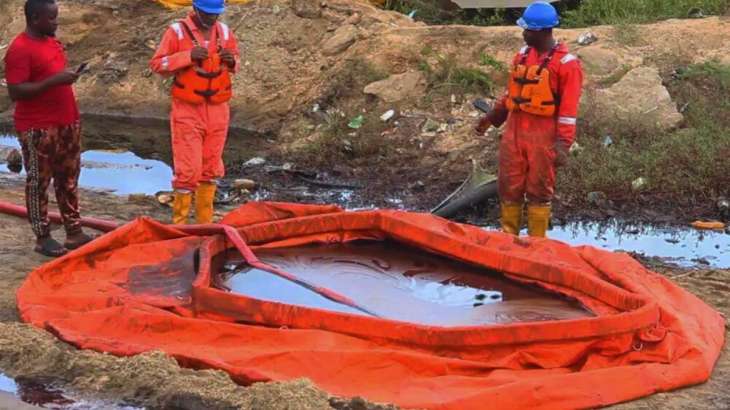
A new oil spill at a Shell facility in Nigeria has polluted farmland and a river, affecting the livelihoods of fishing and farming communities in part of the Niger Delta that has long suffered environmental pollution caused by the oil industry. Used to be. The National Oil Spill Detection and Response Agency, or NOSDRA, told news agency AP that the leak came from the Shell-run Trans-Niger pipeline that passes through communities in the Eleme region of Ogoniland, an area where the London-based energy giant stores its oil. The exploration has faced local opposition for decades.
The amount of oil spilled has not been determined, but activists have published pictures of polluted fields, water bodies marred by oil slicks and dead fish trapped in sticky crude oil. While leakages in the area are frequent, activists describe them as “major”, according to the United Nations Environment Programme, due to vandalism by oil thieves and lack of maintenance of pipelines.
It is “one of the worst in the last 16 years in Ogoniland,” said Fineface Dumnamen, an environmental activist whose nonprofit monitors spills in the delta region. It started on 11 June. “It lasted for more than a week, flowing down the Okulu River – which joins other rivers and eventually flows into the Atlantic Ocean – and affected several communities and displaced more than 300 fishermen,” Youth and Dumnamene of the Environmental Advocacy Center said.
spread over the fields and the Okulu River
He said the tide had sent the oil slick some 10 kilometers (6 miles) further into the bays near Port Harcourt, the country’s oil trading capital. Shell stopped production in Ogoniland more than 20 years ago amid deadly unrest from residents protesting environmental damage, but the Trans-Niger pipeline still carries crude from oil fields in other regions through the region’s communities. Shipped to export terminals.
NOSDRA Director General Idris Musa said the leak has been contained, but treatment for the effects of the leak into the Okulu River, which flows through farms and communities, is pending. Musa blamed the protesting residents, saying, “There has been a delay in the response.” “But the engagement is going on.”
The apparent standoff stems from mistrust and past grievances in the riverine and oil-rich Niger Delta region, which is home to most minority ethnic groups that the Nigerian government accuses of marginalization.
Activists say Africa’s largest economy relies heavily on the Niger Delta’s oil resources for its earnings, but pollution from that production has denied residents access to clean water, farming and fishing Catching has harmed and increased the risk of violence.
“Communities are very angry at the loss of their livelihoods due to the obsolescence of Shell’s equipment and are worried that regulators and Shell will hold the residents responsible for the sabotage,” Dumnamane said.
Often oil companies allege sabotage in the pipeline
Oil companies often blame spills on pipeline sabotage by oil thieves or victimized youths from affected communities, allowing the companies to avoid liability. London-based Shell said it was working with a joint investigation team, comprising regulators, Ogoniland residents and local authorities, to identify the cause and effect of the leak.
“Subject to safety requirements, Shell’s response team has been activated to be on site to take necessary actions to protect the environment, people and equipment,” a company statement said.
NOSDRA confirmed a joint investigation, but the cause of the leak – whether sabotage or equipment failure – has not yet been revealed. Dumnamane said hundreds of farmers and fishermen who have been cut off from their livelihoods will push for restoration of the environment and then compensation.
UN report criticizes Nigerian government over 50 years of pollution
At the request of the Nigerian government, the United Nations Environment Program conducted an independent environmental assessment of Ogoniland, releasing a report in 2011 criticizing Shell and the Nigerian government for 50 years of pollution and recommending a comprehensive, billion-dollar cleanup. done. While the government announced a cleanup in 2016, there is little evidence of restoration on the ground. The government says community protests and lawsuits from local activists have hindered progress.
“A credible cleanup would have been a ray of hope for the Niger Delta and other areas in Africa that are suffering from oil pollution, but no credible cleanup is underway,” said Ledum Miti, a veteran Ogoni environmental activist and former president of the Movement for Peace. ” existence of the Ogoni people. “It’s a cover-up, and we don’t see its effect.” (AP)
(with input from AP)
Also read: Sweden: 1 dead, several injured after roller-coaster derails at Gröna Lund amusement park